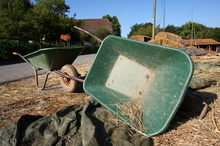For horse owners who have thought about making their farm or facility more environmentally friendly, Wingberry Farms in Canada is setting a good example.

Improving horse manure management to be environmentally friendly
By incorporating Best Management Practices to improve the equine farm's overall environmental health, Wingberry Farms has thrived and maintained the natural beauty of its property.
Plenty can be learned from Wingberry Farms in the headwaters of the Humber River in King Township. By incorporating a number of Best Management Practice (BMP) projects to improve the farm's overall health, Wingberry Farms has not only thrived but has maintained the natural beauty of its property.
Owned and operated by Harry Littler and his family, Wingberry Farms offers elite boarding and training for the equine enthusiast. While some of the farm's varied landscape is not suitable for equine use, Mr. Littler's efforts in the protection of the farm's environment and natural habitat are evident throughout the property.
From fostering a healthy, diverse forest to constructing a manure storage facility, his ongoing environmental improvement efforts have helped Wingberry Farms become a prime example of environmental stewardship on equine farms.
In addition to the Humber River meandering through the property, Wingberry is also fortunate to have a mature forest, pond, and wetland. With 30 horses on the farm at one time, it was important to Harry to protect the health of these ecosystems. One issue of concern was nutrient management. After researching various manure management methods, the Littlersdecided the best way to manage their manure was through the construction of a covered manure storage facility.
In 2010, working in partnership with Toronto and Region Conservation's (TRCA) Rural Clean Water Program (RCWP), the Littlers secured cost share funding to construct a storage facility which included a concrete pad, three 8 foot walls and a roof.
A nutrient management specialist assisted with calculating the storage size and provided recommendations on its location. Harry, a trained engineer, designed the facility which was then constructed by a contractor.
To facilitate drainage, the storage features a poured concrete pad that is sloped towards the back and mortared cinder block walls which will contain contaminated runoff. The roof will virtually eliminate any clean water from entering the facility and becoming contaminated.
One of the key features of the facility from an environmental perspective is its location. Run-off from improperly handled horse manure can affect the quality of surface water and groundwater because manure run-off contains elevated phosphorus and nitrogen levels as well as pathogens that can be harmful to the natural environment and people.
To help protect the important water features on the farm from the potential negative impacts of nutrient rich manure runoff, the Littlers constructed the facility more than 250 metres away from the well, barn and river valley. "Protecting the health of my farm and the watershed is more important to me than saving the few extra minutes it might take to travel the distance to the storage," said Harry.
In 2013, the Littlers will once again work with the RCWP to implement a tree and shrub planting project and upgrade the farm's fuel storage facility.
In the meantime, the Littlers continue to protect and preserve the farm's environmental health simply through minor changes in how they operate their farm. "The health of our farm is important to us. When our farm is healthy, everything that lives here is healthy too," said Harry.
If you are interested in undertaking environmental improvements on your farm property, technical assistance and financial incentive may be available to eligible landowners. To learn more about the RCWP or other stewardship programs, contact Toronto and Region Conservation at 416-661-6600, ext 5349. Information can also be found at TRCA
Not sure which of the 36 Conservation Authorities you should contact? Check out the provincial map Conservation Ontario
Story by: Nadine Abrams - An Equine Guelph Press Release
